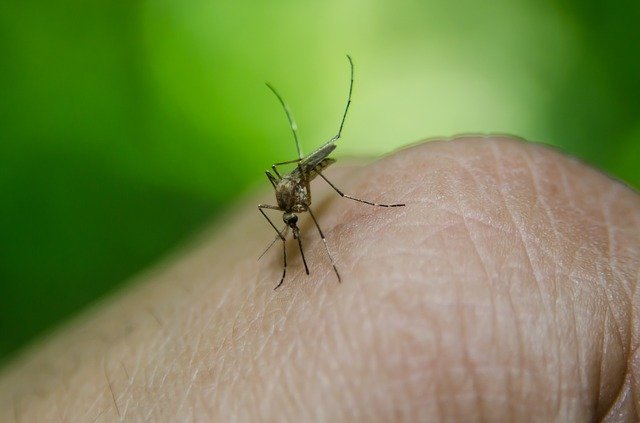NH DHHS Identifies First Mosquito Batch in 2020 to Test Positive for West Nile Virus
Concord, NH – The New Hampshire Department of Health and Human Services (DHHS) has identified the first batch of mosquitoes to test positive for West Nile virus (WNV) this season. The batch was found recently in the city of Manchester. DHHS is working in partnership with the City of Manchester Health Department on providing additional risk mitigation information to Manchester residents and surrounding towns.
“West Nile virus is transmitted to humans from the bite of an infected mosquito,” said NH State Epidemiologist, Dr. Benjamin Chan. “The best way to prevent WNV and other mosquito-transmitted infections is to take steps to avoid mosquito bites by using an insect repellent effective against mosquitoes, avoid being outdoors between dusk and dawn when mosquitoes are most active, and remove any standing water from around the home, where mosquitoes reproduce.”
WNV is an arbovirus transmitted from the bite of an infected mosquito. WNV was first identified in New Hampshire in August of 2000. For the last decade, WNV activity has been detected every year in NH. The most recent human case of WNV in NH was in an adult in 2017. Typically, WNV activity increases in years where drought conditions exist. Even though we have been experiencing cooler fall weather, the risk for WNV and eastern equine encephalitis virus (EEEV) will continue to increase until there is a statewide mosquito killing hard frost.
Symptoms of WNV usually appear within a week after being bitten by an infected mosquito, although many people can be infected and not develop any symptoms, or only develop very mild symptoms. Symptoms can include flu-like illness including fever, muscle aches, headaches, and fatigue. A very small percentage of individuals infected with WNV can go on to develop more serious central nervous system disease, including meningitis or encephalitis. If you or someone you know is experiencing flu-like symptoms, including fever and headache, contact your local medical provider.
Prevention guidelines for WNV, and other arboviral diseases of concern, can be found below. Anyone with questions about arboviruses can call the New Hampshire Bureau if Infectious Disease Control at 603-271-4496. Fact Sheets on these diseases are available on the DHHS website at www.dhhs.nh.gov. For more information, please visit the Centers for Disease Control and Prevention website at www.cdc.gov.
# # #
Prevention Guidelines for Mosquito and Tick Diseases
NH Department of Health and Human Services, Division of Public Health Services
- Eliminate habitat and breeding locations.
Mosquitoes
- Mosquitoes lay their eggs in standing water. Remove outdoor items that hold water (old tires, cans, plastic containers, ceramic pots).
- Drill holes in the bottom of outdoor recycling containers, clean roof gutters and ensure proper drainage.
- If not in use, empty and/or cover swimming pools, wading pools and hot tubs.
- Turn over wheelbarrows and change water in birdbaths at least twice weekly.
Ticks
- Minimizing areas where hosts for the ticks, such as rodents and deer, can congregate to eat, sleep or feed.
- Be aware of where mosquitoes and ticks live.
- Weeds, tall grass, and bushes provide an outdoor home for mosquitoes and ticks, alike.
- Make sure that doors and windows have tight-fitting screens. Repair or replace all screens in your home that have tears or holes.
- Resting mosquitoes can often be flushed from indoor resting sites by using sweeping motions under beds, behind bedside tables etc. and once in flight, exterminated prior to sleeping at night.
- Avoid tick-infested areas. If in tick-infested areas, walk in the center of trails to avoid contact with overgrown grass, brush, and leaf litter at trail edges.
- Protect yourself from bites.
- When outside, wear protective clothing such as socks, long-sleeved shirts, and long pants (preferably tucked in socks). Light-colored clothing helps you spot ticks.
- Consider avoiding outdoor activities in the early morning and evening, when mosquitoes are most likely to be biting.
- Wear insect repellents, such as one containing 30% or less DEET (N,N-diethyl-methyl-meta-toluamide), Picaridin, para-menthane-diol, IR3535, or 2-undecanone or oil of lemon eucalyptus. Treat clothing with permethrin, which is odorless when dry.
- Vitamin B, ultrasonic devices, incense, and bug zappers have not been shown to be effective in preventing mosquito bites.
- Shower as soon as possible after spending time outdoors.
- Check for ticks daily, on you and your pets. Ticks can hide under the armpits, behind the knees, in the hair, and in the groin.
- Wash and dry clothing after being outdoors. Tumble clothes in a dryer on high heat for 10 minutes to kill ticks on dry clothing. If the clothes are damp, additional time may be needed.
- Early removal of ticks can reduce the risk of infection. Inspect all body surfaces carefully, and remove attached ticks with tweezers. Monitor your health closely after a tick bite and be alert for symptoms of illness. Contact your physician to discuss testing and treatment.
For more information on mosquito-borne diseases, visit the DHHS Website at www.dhhs.nh.gov.



